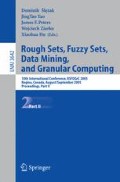Abstract
This study develops a group decision-making model based on Variable Precision Rough Set, which can be used to adjust classification error in decision tables consisting of risk-evading level (REL) of software project bidding. In order to reflect experts’ ability, impartiality and carefulness roundly during the course of group decision-making, a weight is endowed with each expert. Integrated risk-evading level (IREL) of projects and risk indices are computed. Then, risk-evading measures, the rank of risk-evading strength and risk-evading methodology are discussed.
Access this chapter
Tax calculation will be finalised at checkout
Purchases are for personal use only
Preview
Unable to display preview. Download preview PDF.
References
Gerardine, D., Brent, G.R.: A foundation for the study of group decision support systems. Management Science 33(5), 589–609 (1987)
Bidgoli, H.: Group decision support system. Journal of System Management 14(1), 56–62 (1996)
Ziarko, W.: Variable precision rough set model. Journal of Computer and System Sciences 46(1), 39–59 (1993)
Beynon, M.: The Elucidation of an Iterative Procedure to ęÂ-Reduct Selection in the Variable Precision Rough Sets Model. In: Tsumoto, S., Słowiński, R., Komorowski, J., Grzymała-Busse, J.W. (eds.) RSCTC 2004. LNCS (LNAI), vol. 3066, pp. 412–417. Springer, Heidelberg (2004)
Ramanathan, R., Ganesh, L.S.: Group preference aggregation methods employed in AHP: An evaluation and an intrinsic process for deriving members’ weightages. European Journal of Operational Research 79, 249–265 (1994)
Saaty, T.L.: The Analytic Hierarchy Process. McGraw-Hill, New York (1980)
Hayden, T.L., Tarazaga, P.: Distance matrices and regular figures. Linear Algebra Appl. 195, 9–16 (1993)
Trosset, M.W.: Distance Matrix Completion by Numerical Optimization. Computational Optimization and Applications 17, 11–22 (2000)
Wu, Q.L.: Risk analysis before tender. Chinese Cost Management of Railway Engineering 1, 21–24 (2000)
Patterson, F.D., Neailey, K.: A risk register database system to aid the management of project risk. International Journal of Project Management 20, 365–374 (2002)
Author information
Authors and Affiliations
Editor information
Editors and Affiliations
Rights and permissions
Copyright information
© 2005 Springer-Verlag Berlin Heidelberg
About this paper
Cite this paper
Xie, G., Zhang, J., Lai, K.K. (2005). A Group Decision-Making Model of Risk Evasion in Software Project Bidding Based on VPRS. In: Ślęzak, D., Yao, J., Peters, J.F., Ziarko, W., Hu, X. (eds) Rough Sets, Fuzzy Sets, Data Mining, and Granular Computing. RSFDGrC 2005. Lecture Notes in Computer Science(), vol 3642. Springer, Berlin, Heidelberg. https://doi.org/10.1007/11548706_56
Download citation
DOI: https://doi.org/10.1007/11548706_56
Publisher Name: Springer, Berlin, Heidelberg
Print ISBN: 978-3-540-28660-8
Online ISBN: 978-3-540-31824-8
eBook Packages: Computer ScienceComputer Science (R0)

